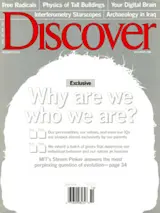The following dialogue is an excerpt from a roundtable discussion sponsored by the National Science Foundation and Discover magazine, held June 11, 2002, at the Hart Senate Office Building in Washington, D.C.
ERIC HASELTINE: When we went to school, learning mathematics was, especially in the lower grades, a rather rote, dull affair. Reform has swept through the classroom in the last 10 years as critics argued that students needed to learn how to solve problems rather than just practice the same old skill sets. In fact, now that calculators are ubiquitous, many school systems are thinking about only briefly teaching kids the hardest math they face in early education—long division. This sounds as if it might be liberating, but I wonder if the panel thinks it will work.
1 John Horton Conway is the John von Neumann Professor of Mathematics at Princeton University. He received his Ph.D. from the University ...














